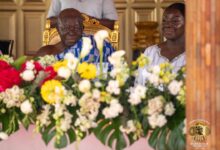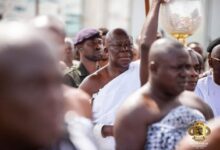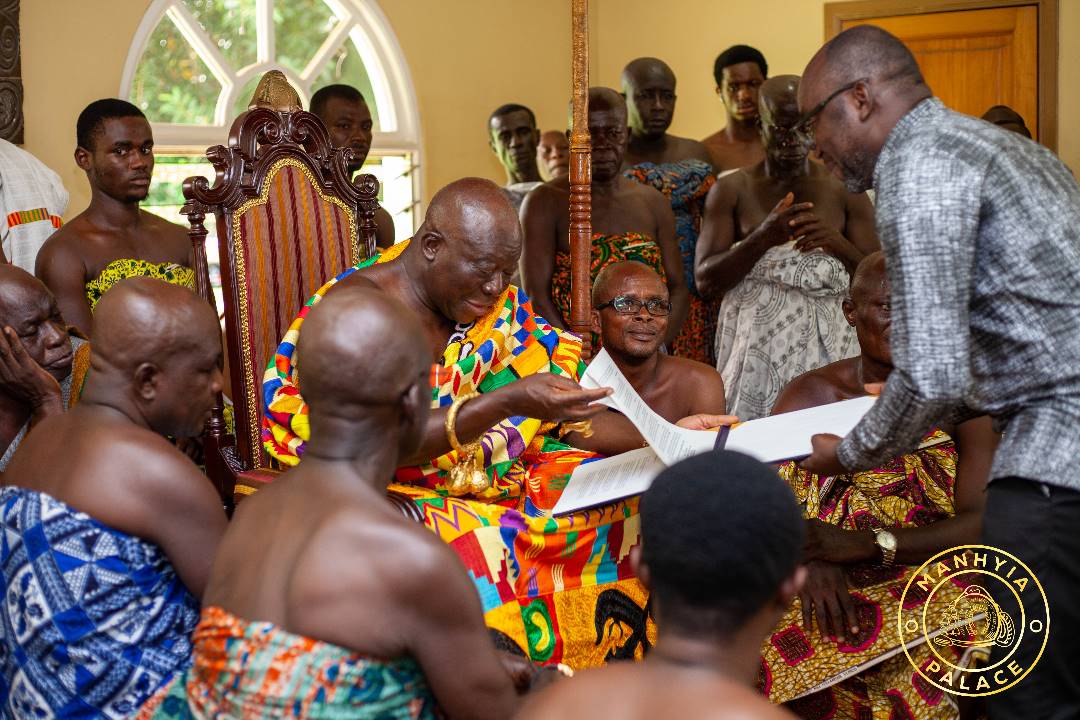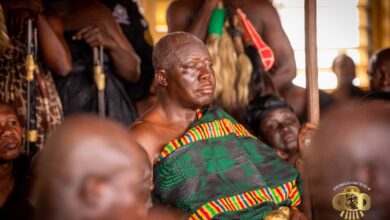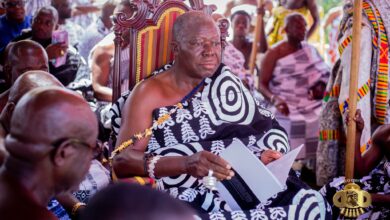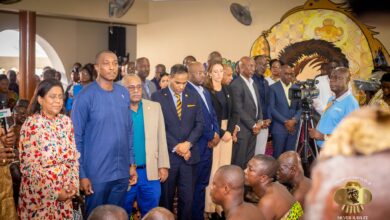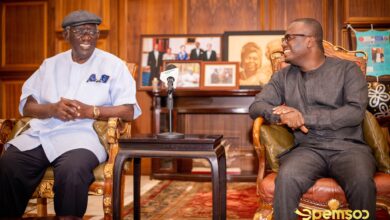Asantehene Delivers Lecture On Africa Enslavement At The University of West Indies
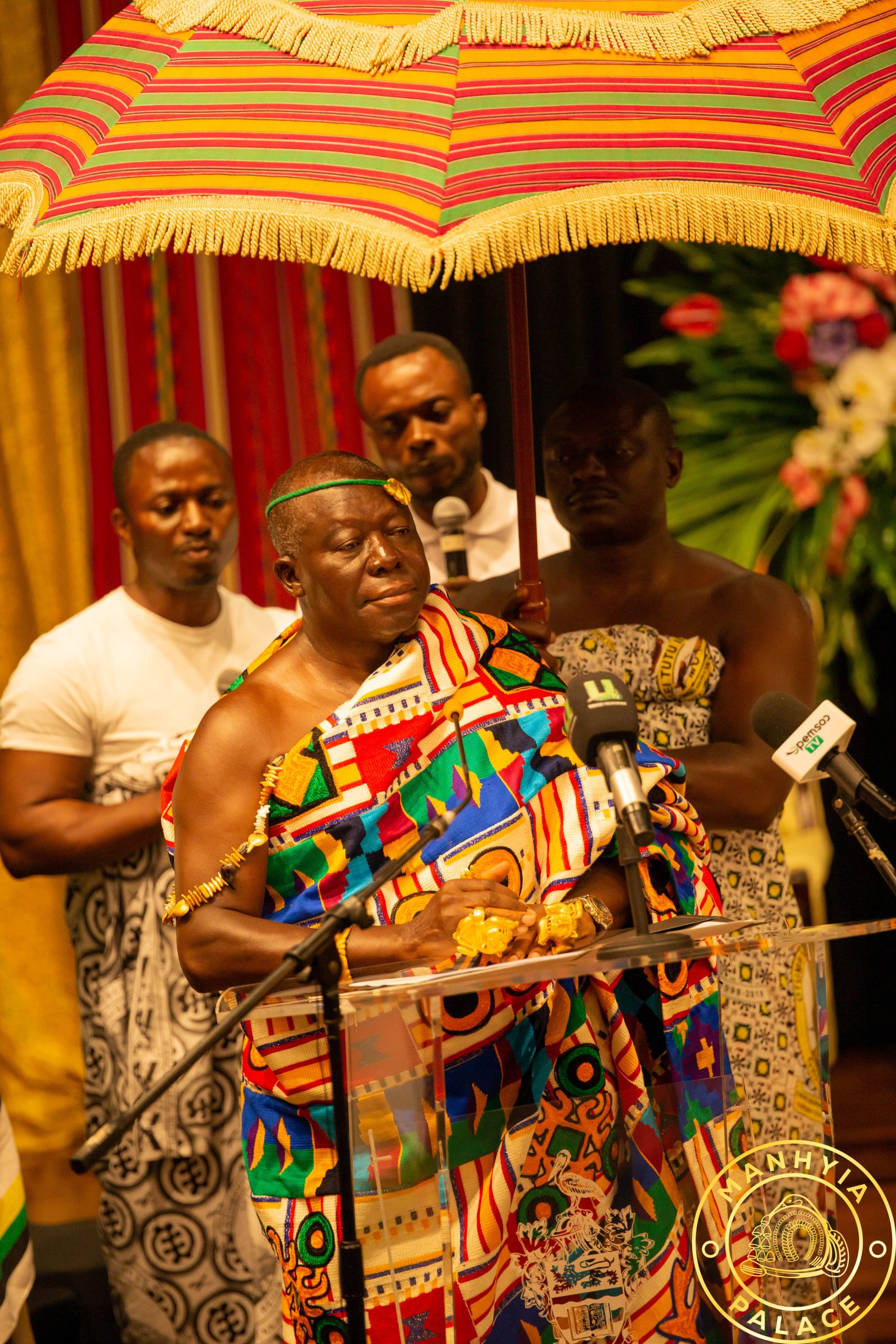
The King of the Asante Kingdom, Otumfuo Osei Tutu II delivered a lecture at the St Augustine Campus of the University of West Indies (UWI) in Trinidad and Tobago, the second such lecture in an island country.
Present were the Prime Minister of the dual island country, Dr the Hon Keith Rowley and some leadership of the University as well as the entourage of the King.
The lecture which was delivered on Thursday, August 3, 2023, centred mainly on African enslavement and its ripple effect on the continent and people of the Caribbean and the way forward.
He pointed to the twisted history and tales about the glorious continent as well as false notions carved by the West as contributing factors to the “conjoined” problem faced by both the Caribbean and Africa.
According to the Monarch, understanding the historical experience is the first way to deal with it.
Impact Of Colonialism And Slavery
Otumfuo in his lecture indicated that the civilization and evolution of men, communities, kingdoms and states gave rise to rivalry and conflict which saw the conquests of kingdoms, empires and nations by others, also referred to as colonization through war.
He indicated that all the now powerful countries including Spain, Portugal, France, Germany and the United States (USA) had their fair share of this rivalry and therefore noted that colonisation was universal and on that note rubbished the notion that people of African heritage are species fated to be subjugated and enslaved.
That notwithstanding, he noted that the degree of harm that was done to Africans in slavery and colonisation was immeasurable.
“Africa’s experience of them has been of an infinitely different order of magnitude in humanity. With the possible exception of the Holocaust, no event in human history has descended to the depth of bestiality which characterise the Trans-Atlantic Slave trade and nothing in colonial history has any parallel with the ignominious scramble for Africa when Europeans obliged themselves to a lottery of carving up the whole continent and sharing it among themselves like it was a piece of cake.”
He asserted that pre-emancipation experiences left physical and mental scars on victims and their descendants which required treatment just like the Post Traumatic Stress Syndrome and couldn’t agree more with advocates like Marcus Gavi, who held that emancipation on its own could be of no effect without a conscious effort to liberate the minds of the people after centuries of subjugation and the colonisation.
“If post-Vietnam, the world has discovered Post Traumatic Stress Syndrome and has found the appropriate treatment for it, there we ask, ‘what of post-emancipation?’ can it be or is it late to identify scientifically the physical, psychological and social fallout from the hell fire of the pre-emancipation experience and the appropriate remedies for it?” he asked.
His Majesty recognizes that people of African descent among other challenges are grappling with perceived low esteem and blames this on the failure to liberate them from the combined mental and psychological effects of slavery and colonialism post-emancipation as well as the written and oral literature carved by the West about the continent.
Retelling The African Story
For His Majesty, what people of African origin must focus on is to retell their story.
“The most important point that arises for me which is what I need to stress is the challenge to take hold and create our own narrative.”
He highlighted the splendour, civilisation and systems of government in the pre-colonial and pre-slavery era in which the people living on the continent of Africa were found and alluded to some Kingdoms and countries such as ancient Ghana, Mali and the Songhai Empires.
He said these “remarkable experiences” have been shoved in the dark by scholars who rather take delight in recognizing Africa with their experience with the Europeans.
“Much of the literature of the past have so twisted history, distilled obviously convulsive philosophies and peddled such fraudulent and obnoxious signs,” he said and made references which testified that casting a shadow on Africa’s history was consciously done.
“In the mid-1970s, a distinguished British soldier in Academy who was once commander in chief of the British Army, General Sir John Hackett wrote a book in which he sought to construct a scenario of what a Third World War might be. He opened a chapter on the cradle of conflict with a British Major asking his frictional General about what history will say about the comings and goings that have precipitated the war. The General replied without hesitation ‘History will lie’. It was the opening sentence in the Chapter about the Middle East and Africa through insight he concluded that the General knew what he was talking about.”
“It’s almost as though when it comes to the experience of Africa truth is fated to be casualty, avoiding the beaten track of truism. As the Australian sociologist Hannah Arendt would say, it’s a long-established attitude towards African heritage. They are either the exotic pebbles some white men found in a forbidden land and managed to shape into something useful according to his taste or just some sub-human species guarded into civilisation by some truly selfless European servants of God.
“Africa is either the land of colonialism where faithful Europeans toiled to elevate from primitive existence into the light of civilisation or simply the continent of slavery from where slaves were sold to serve the world. By the dominant narrative of today, nobody will be faulted for believing that both colonialism and slavery are specifically African phenomena. Nothing could be farther from the truth.”
These, he affirms must be altered by the retelling the tales of Africa.
“We should be capable of mastering the energy to debunk the misconception of the past and build a better world for ourselves. The examples we have cited should inspire us to build inclusive societies where people of all races and religions share a common destiny. We should take pride in our heritage, in our past, in our resilience and our capacities to survive the strings and arrows and still stand to conquer. Africa which is the cradle of mankind remains today a future of mankind.”
Peace Path
On the way forward, the King suggested that the Caribbean and Africa must smoke the peace pipe and reconcile with the West in the manner in which African leaders like Prempeh I and Nelson Mandela did years back.
“Nelson Mandela walked out of Robben Island to embrace the symbol of the system that had incarcerated him for 24 years and held his people in the bondage of apartheid. Long before Mandela, my own grand uncle, King Prempeh I had been seized and sent into exile to live in distress and humiliation. He returned home 29 years later to hold out the hand of peace and reconciliation.
“…Four times we waged war against the British to resist their attempt at colonial subjugation but we have come to terms with the course of history and better still we are fortified in our belief that the courage to wage war is meaningless unless it is backed by the wisdom to make peace. That is the broader promise of African heritage.”
He is of the firm view that holding onto the grudges of colonialism and enslavement will do no good than replicate the “poisonous fruits” of the Crusade the Middle East is battling today.


